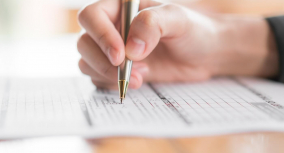So, you are going to take IELTS. But, have you chosen which one of them to take? There are, in fact, two types of IELTS: Academic and General Training. They differ in structure and some other aspects.
The choice is all about your goals. Want to study abroad? IELTS Academic will suit you. Planning to move to an English-speaking country? Then, take IELTS General Training.
From this article by our custom writing team, you will learn:
- The difference between Academic and General IELTS;
- Test tips and preparation strategies;
- How to choose the test that suits you.
🆚 IELTS: Academic vs. General
Let’s start with the crucial aspects to consider while choosing the test type. If you’re wondering which one suits you best, read the information below.
🤔 Which One Should You Choose?
That’s definitely a good question, and here is why. If you pick the wrong exam type, you may not achieve your desired goals. Read on to learn more about IELTS Academic and General Training.
First, let’s study the purpose of each test type.
Next, let’s see who usually takes which of the exam types.
In a nutshell, the Academic test is for an educational setting, while General Training is for everyday life situations. The former is more difficult because it assesses your readiness to work with academic texts. Take it into account in case you decide to take this IELTS test type.
🎓 IELTS Academic vs. General: Similarities & Differences
IELTS Academic and General Training differ not only in purpose but also in test format. Listening and Speaking are the same for both types, while Reading and Writing are distinct.

Want to know more about similar and different characteristics of Reading and Writing tests? Have a look at the tables below.
IELTS ReadingTests: Academic vs. General Training
IELTS WritingTests: Academic vs. General Training
🎓 IELTS Preparation Tips: Listening & Speaking
As we’ve mentioned earlier, Listening and Speaking tests are the same for Academic and General Training exams. That’s why the following strategies will be helpful for everyone who is planning to take IELTS.
🔊 IELTS Listening Tips: How to Succeed in 4 Steps
Let’s start with listening tricks. Remember that they apply to both exam types.
- Pay attention to keywords. These are words or phrases that provide insight on what you should focus on while answering. Some of them can be replaced by synonyms. However, the most useful ones are those you can’t paraphrase. These are names, academic terms, dates, etc. They can help you follow the ideas of the speaker and locate the answers. It’s useful to circle or underline the keywords while listening.
- Look out for signposts. A signpost is a word or a word combination that helps you understand the speaker’s intentions: repeat the information, give details, and move to another point. Here are some examples:
Example:
- one more aspect to consider is
- going into more detail
- going back to
- let’s turn to
- expanding on
- Keep an eye on several questions simultaneously. It means that when you are locating the answer to question 20, look for the answers to other questions. It will help not to miss transitions and relevant details.
- Practicelistening to different English accents at home. This activity can improve your general understanding of the language. Texts are delivered by speakers of various origins. So, be prepared to recognize pronunciation peculiarities.
💬 IELTS Speaking Tips: 6 Essential Strategies
The first tip we want to give you regarding the Speaking part is that staying calm and focused will help you deliver a perfect band score answer. But there are more strategies for you: check them out!
- Give extended answers. Your answers shouldn’t be just one or two sentences. The examiner evaluates your fluency and the ability to say something without much effort. Besides, how you speak is more important than what you say. So, even if you say some silly things, but in a fluent and coherent manner, your scores won’t be lowered.
- Structure your answers. Try not to jump from one point to another. Instead, be consistent and logical.
- Use the given prompts relevantly. You don’t have to follow them and use all the words written on the cue cards. These are only suggestions, and you can freely go off the topic.
- Pay attention to fillers. A filler is a word or a phrase that fills the gaps while you’re thinking over the answer. Using them appropriately will demonstrate your rich vocabulary and your ability to speak fluently and coherently. It’s useful to learn some fillers beforehand:
Example:
- well, I’m not perfectly sure
- let me see/let me think
- I guess
- I haven’t thought about this issue yet
Keep in mind that only meaningful words count as good fillers. Sounds like “umm” and “ahh” are not meaningful, and it’s best to avoid them.
- Speak in an optimal tempo. Don’t speak too slowly or too fast. Instead, aim at sounding fluent and natural. Also, try to avoid long pauses for the listener not to lose the gist of your speech.
- Correct yourself mindfully. If you make some minor grammar errors, don’t correct them. Otherwise, the examiners might think you struggle with speaking fluently. Made a single-word vocabulary mistake? It’s okay to fix them. Just say the correct variant.
✏️ IELTS Preparation Tips: Reading & Writing
When it comes to the Reading and Writing sections, the preparation strategies are different for IELTS Academic vs. General Training. We’ve compiled the best tips and tricks that will surely help you pass the test.
📚 8 IELTS Reading Tips for General Training
“How can I improve my reading comprehension?” That’s a good question. Check the following strategies and find out how to prepare for this part of the exam.
- Learn how to deal with different types of questions. The reading part consists of 11 different question types. These include true-false statements, matching headings, completing sentences, multiple-choice, etc. Your task is to learn how to deal with all of them. Practice these skills at home using mock tests:
- Search for connections. Scanning and skimming will help you do this. Skimming means looking through the passage quickly without concentrating on details. Scanning means searching for keywords in questions and then in texts. Start with scanning the questions for keywords. Then, skim the text and locate them. Keywords can be obvious (dates, names, terms) and paraphrased or substituted by synonyms.
- Be ready to read quickly. Keep in mind that there’s a rigid time limit. That’s why you need to read fast. Make sure to have plenty of speed reading practice at home.
- Find the main idea. If you struggle to comprehend the whole passage, don’t worry. You only need to locate the answers. Don’t waste your time understanding each word. Instead, focus on the main points.
- Expand your vocabulary. It’s especially useful to learn new words in context. You need to know how and when to use a word or a phrase. That’s why, when you write down the new units, add their collocations, synonyms, and some examples. It will help you locate keywords when they’re paraphrased or substituted by synonyms. Remember that it’s better to learn vocabulary from practice reading texts.
- Focus on everyday life topics. Unlike the Academic one, the General Training Reading test is about everyday life matters. Learning words related to such topics will help you ace the test.
- Read relevant kinds of texts to prepare well. To get ready for the Social and Workplace Survival sections, read instruction manuals, contracts, and schedules. The General Reading section contains abstracts from newspapers, magazines, and books: practice reading these sources as well.
- Mind your grammar while answering questions. Not only the content but also grammar is scored. That’s why, when checking your answers, make sure there are no mistakes. In case you make them, take your time to practice the grammar rules you struggle with.
📰 IELTS Academic Reading Tips: Top 5 Strategies
In Academic Reading, the task types are the same as with General Training. However, the texts themselves are very different and often challenging. That’s why adequate and relevant preparation is essential. Start with studying the following tips.
- Pay attention to academic-related vocabulary. IELTS Academic focuses on advanced topics. That’s why you need to learn appropriate vocabulary: terms, advanced lexis, formal notions, and phrases, etc.
- Explore a wide range of topics. Read about space exploration, politics, environment, world economics, society, psychology, artificial intelligence, business, history, medicine, innovations, and world changes.
- Search for useful practice resources. Read reliable newspapers and magazines to advance your reading skills and enrich your vocabulary or find a learning quiz you could take. Here are some helpful resources:
- Learn to separate your opinions from the author’s. Test takers often make the mistake of letting their own knowledge influence the interpretation of the author’s views. It’s especially dangerous with Academic Reading. Make sure to approach the texts objectively as you complete mock tests.
- Practice reading academic texts under timed conditions. Your task will be to study the texts and answer the questions very quickly. Keep in mind that there will be no extra time for transferring your answers. That’s why it may be useful to practice reading with a timer on.
📝 IELTS General Writing Tips: Top 10 Strategies
Don’t know how to succeed in this part of the exam? Check out the following strategies. They will help you improve your writing skills and get higher scores.
Tips for Task 1: The Letter
Here’s a bonus tip: learn some opening and closing statements for letter writing. They will help you sound more authentic. Besides, you wouldn’t have to spend time coming up with introductions and conclusions.
Tips for Task 2: The Essay
Bonus tip: learn how to use linking words. They help to connect your ideas or to show transitions. Use them in Task 2 to sound more natural and logical.
✍️ 4 Essential IELTS Academic Writing Tips: Tasks 1 & 2
Don’t know how to complete the Academic Writing test successfully? Learn the following strategies and practice them.
Tips for Task 1: The Graph
Tips for Task 2: The Essay
And now you know the difference between IELTS Academic vs. General Training. Follow the suggested tips and tricks to get plenty of self-preparation at home. Then, you will definitely get a high score.
We hope you have found this article valuable and helpful. We wish you good luck with the exam! Liked the article? Help others to know about it as well by sharing or leaving a comment.
You might also like:
- How to Improve Your Test-Taking Skills: Top Tips & Strategies
- LPI Essay Samples: An Effective Way to Prepare for the Test
- How to Study Effectively: 12 Study Tricks to Save Time
- Improve Your English: Learning Tips & Materials
- A Complete Guide to Essay Writing—Make it Simple
🔍 References
- IELTS Test Types: IELTS.org
- Which Test Should I Take?: Take IELTS: British Council
- Question Types in General Training Reading Test: IDP Canada
- IELTS Test Format: Cambridge English
- Structure of a Formal Letter: ThoughtCo
- Basic Essay Format: Utah Valley University
- Academic Listening Skills: University of Toronto
- Why Filler Words Like “Um” and “Ah” Are Actually Useful: Harvard Business Review
- Word Count: British Council
- Identifying Trends of a Graph: Lumen Learning
- Examples of Linking Words and Phrases: FutureLearn





![Unexpected Career Tips from Celebrities [2026 Edition]](https://custom-writing.org/blog/wp-content/uploads/2021/01/Career-tips-title-1-284x153.jpg)





